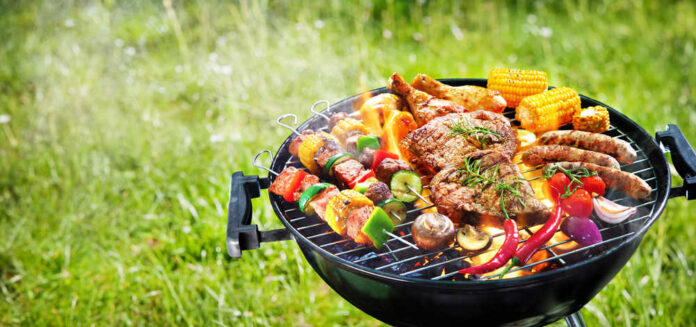
For many of us, summertime is grilling time. Whether you’re cooking for a backyard barbecue or just trying to get dinner on the table, grilling is a great outdoor option for preparing a delicious meal.
But is grilling a healthy way to prepare your food? There are a few risks that you should be aware of.
Potential Food Poisoning
If you’re not careful, cooking meat and poultry on the grill can easily lead to food poisoning for you and your dinner-mates.
It can happen through cross-contamination, unwashed hands, undercooking, or eating food sitting out for too long.
Food safety tips include:
- Wash hands thoroughly with soap and water before and after handling different types of food.
- Keep raw meats separate from other foods, including any utensils, dishes, or cutting boards that they come in contact with
- Do not put any cooked meat back on the same plate that held raw meat.
- Cook meats thoroughly so that they reach the proper internal temperature
- Do not leave food sitting out for more than two hours.
- Keep foods covered to avoid attracting bugs (which may have bacteria on their feet)
- Keep hot foods hot and cold foods cold.
- Use a food thermometer to check that meats are cooked all the way through
Grilling Can Increase Your Cancer Risk
Grilling at high temperatures causes the muscle proteins in the meat to form compounds called heterocyclic amines (HCA). HCAs are linked to an increased risk of cancer, particularly stomach, colon, prostate, pancreatic, and breast cancer. They also appear to lead to less successful treatment outcomes for people who have already been diagnosed with cancer.
Another carcinogenic risk of grilling occurs when fat drips from the meat onto the flames. The fumes and smoke that rise from the grill can contain polycyclic aromatic hydrocarbons (PAHs), which can adhere to the surface of the meat. Consumption of PAHs can damage your DNA and significantly increase your cancer risk.
To limit your risk of exposure to these carcinogenic compounds:
- Cut off visible fat before cooking.
- Remove burnt or blackened areas of meat before eating.
- Don’t char or overcook the meat.
- Use leaner cuts of meat.
- Microwave your meat before grilling
- Put tin foil between the grate and the food.
- Use a gas grill instead of charcoal or wood.
- Arrange charcoal so that flames are not directly underneath the meat
- Cook longer at lower temperatures
- Raise the grilling surface higher above flames
- Clean grill grates often to avoid the buildup of carcinogens.
Commonly Grilled Foods May Be Unhealthy
The meats that are typically grilled (beef, pork, chicken) are often high in unhealthy saturated fats, which can contribute to high cholesterol, elevated blood pressure, insulin resistance, heart disease, and other chronic health problems.
Processed meats (hot dogs, sausages) are popular grilling options, but unfortunately, they are linked to higher risks of cancer and other health issues.
And if you are cooking hamburgers, ensure the ground beef is fully cooked to avoid the risk of bacterial contamination.
To make your grilled meals healthier:
- Make grilled vegetables the main course instead of a small side.
- Also include salads, whole grain sides, and other healthy dishes.
- Trim the fat from meat before cooking
- Limit processed meats
- Use healthy marinades and sauces with less sodium.
You can still enjoy grilling without putting your health at risk. Just be mindful of the potential risks and take steps to minimize them.






















